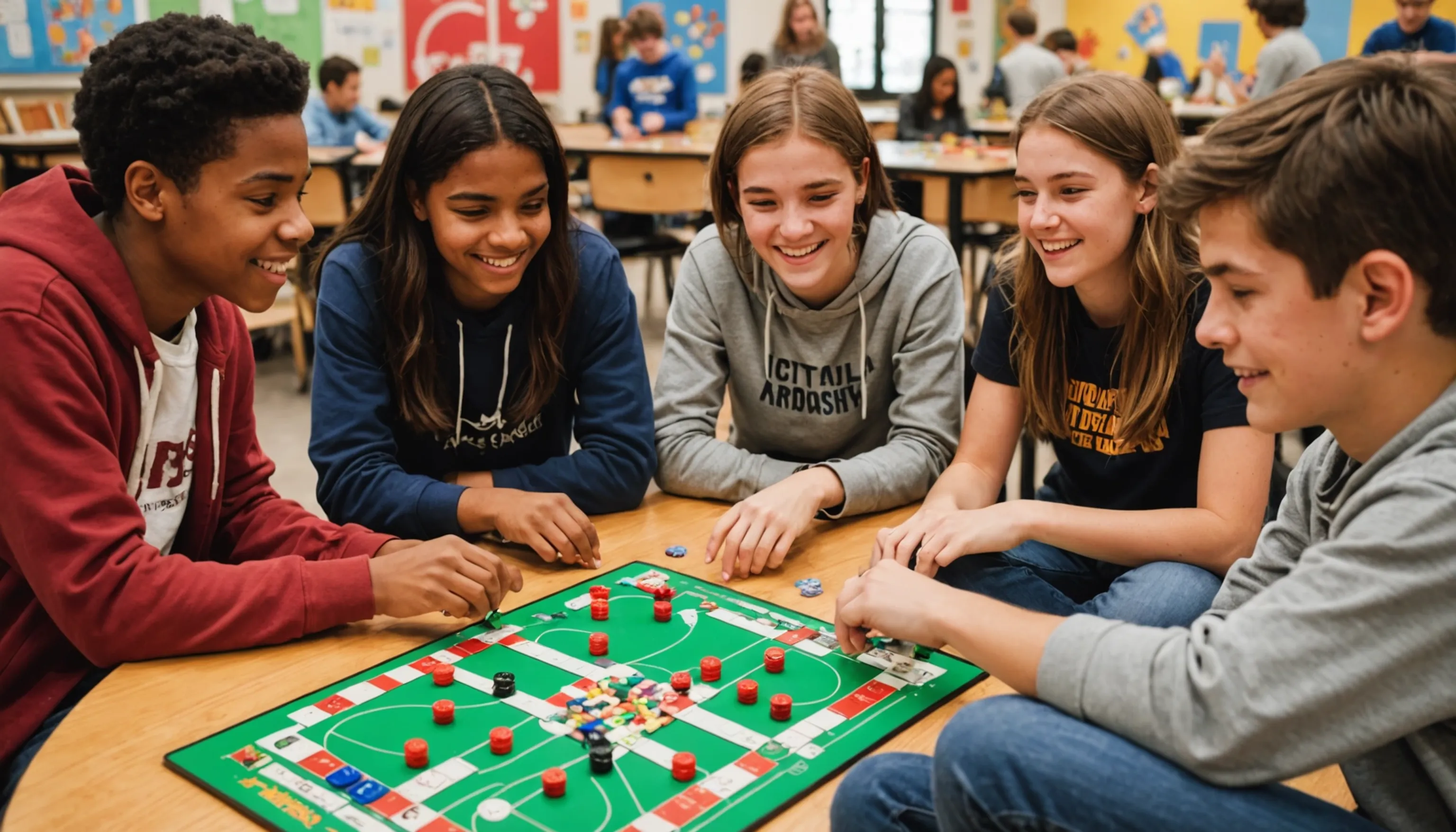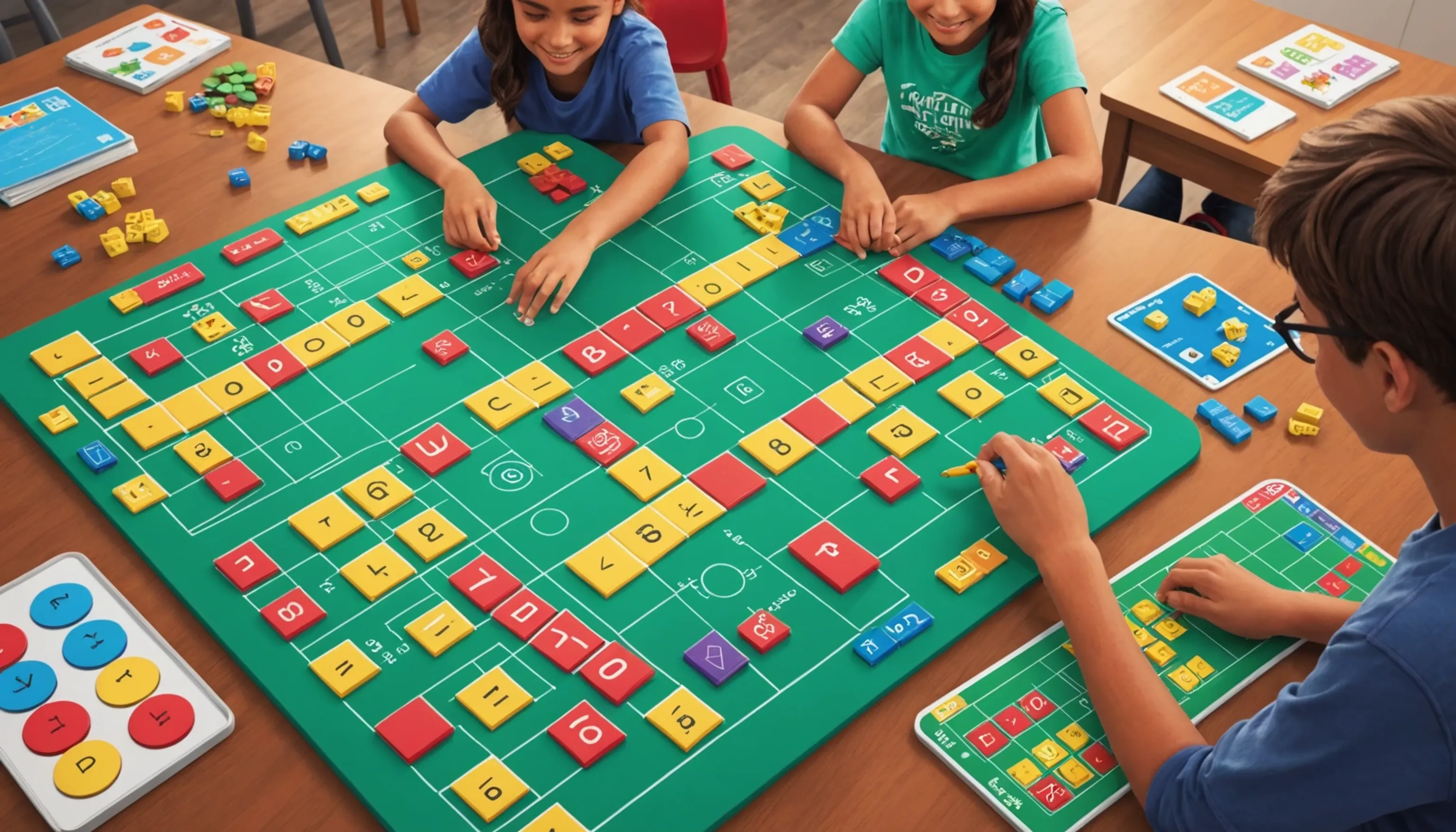Engaging Math Games for Afterschool Programs
 HvWHenry van Wagenberg
HvWHenry van Wagenberg
Engaging Math Games for Afterschool Programs
Engaging math games for afterschool programs can make learning fun and interactive for teenagers. These games not only reinforce mathematical concepts but also encourage teamwork and critical thinking. Whether through board games, online platforms, or hands-on activities, the goal is to create an enjoyable learning environment. For instance, games like Math Jeopardy or Math Bingo can motivate students to practice their skills in a relaxed setting. Moreover, incorporating everyday objects into game activities can enhance understanding and retention. Ultimately, these games can transform the perception of math from a daunting subject to an exciting challenge.
Benefits of Math Games for Teenagers
Math games offer numerous benefits for teenagers, making them an essential tool in afterschool programs. First and foremost, these games enhance mathematical skills in a fun and engaging way. By incorporating playful elements, students are more likely to participate actively, reducing anxiety associated with math.
Additionally, math games foster critical thinking and problem-solving skills. As teenagers encounter various challenges within the games, they learn to strategize, analyze, and make decisions, all of which are vital for academic success and real-life situations.
Another significant benefit is the promotion of teamwork and collaboration. Many math games are designed for groups, encouraging teenagers to work together to solve problems. This not only builds social skills but also helps them learn from one another, creating a supportive learning environment.
Moreover, math games can improve motivation and self-esteem. When students achieve success in a game, even if it's a small victory, it boosts their confidence. This positive reinforcement can lead to a more favorable attitude towards math as a whole.
Finally, integrating math games into afterschool programs allows for differentiated learning. Teachers can tailor games to meet the varying skill levels of students, ensuring that everyone can participate and benefit from the experience. Overall, math games are a valuable resource for enhancing mathematical understanding while promoting essential life skills.

Types of Math Games to Consider
When selecting math games for afterschool programs, it’s essential to consider various types that cater to different learning styles and objectives. Here are some popular options:
- Board Games: Games like Monopoly or Math Dice incorporate math skills into gameplay, making learning enjoyable.
- Online Math Games: Websites and apps such as Kahoot! or Prodigy offer interactive platforms that engage students while reinforcing math concepts.
- Hands-On Activities: Using physical objects like blocks or cards can help students visualize mathematical problems and enhance their understanding.
- Math Puzzles: Sudoku or logic puzzles challenge critical thinking and problem-solving skills, making math fun and stimulating.
- Creative Challenges: Setting up math scavenger hunts or escape room-style games can encourage teamwork and excitement around math.
Choosing a variety of these games can cater to different interests and skill levels, making math learning more engaging.
Board Games that Enhance Math Skills
Board games are a fantastic way to enhance math skills while making learning enjoyable for teenagers. They provide a hands-on approach to learning, encouraging interaction and engagement among players. Here are some board games that effectively boost math abilities:
- Monopoly: This classic game teaches players about money management, budgeting, and basic arithmetic through buying properties and calculating rent.
- Math Dice: A fast-paced game that challenges players to use addition, subtraction, and multiplication to reach target numbers, enhancing mental math skills.
- Sum Swamp: A fun game for younger teens that combines addition and subtraction in a swamp-themed adventure, promoting basic math fluency.
- Prime Climb: This colorful game focuses on prime numbers and basic operations, encouraging strategic thinking and an understanding of number relationships.
- Blokus: While primarily a strategy game, Blokus involves spatial reasoning and geometric thinking, which are vital components of mathematical understanding.
These board games not only reinforce math concepts but also promote critical thinking, strategy, and teamwork. By incorporating these games into afterschool programs, educators can create a dynamic learning environment that encourages students to practice their math skills in a relaxed and enjoyable setting. Ultimately, board games can transform the way teenagers perceive math, fostering a more positive attitude towards the subject.

Online Math Games for Interactive Learning
Online math games offer a dynamic and interactive way for teenagers to enhance their math skills while enjoying the learning process. With the rise of technology, these games provide engaging platforms that cater to various learning styles and preferences. Here are some notable online math games worth exploring:
- Kahoot!: This popular platform allows teachers to create quizzes that students can participate in using their devices. It makes learning competitive and fun, helping to reinforce math concepts through immediate feedback.
- Prodigy Math: Prodigy combines gaming with curriculum-aligned math practice. Players embark on quests and battle monsters while solving math problems tailored to their skill level, making learning feel like an adventure.
- Coolmath Games: This website features a variety of math-based games that promote critical thinking and problem-solving, covering topics from basic arithmetic to advanced concepts in a fun format.
- Math Playground: This site offers numerous interactive math games, puzzles, and logic challenges that make learning math concepts enjoyable and accessible.
- IXL: Although primarily a practice platform, IXL offers interactive activities and games that adapt to students' learning pace, providing personalized math challenges.
By incorporating online math games into afterschool programs, educators can foster a collaborative and engaging learning environment. These games not only enhance mathematical understanding but also help develop essential skills like perseverance, strategy, and teamwork, making math more appealing to teenagers.
Hands-On Activities to Boost Math Understanding
Hands-on activities are an effective way to boost math understanding among teenagers, making abstract concepts more tangible and relatable. Engaging in physical activities allows students to apply mathematical principles in real-world scenarios. Here are some hands-on activities to consider:
- Cooking and Baking: Measuring ingredients not only reinforces fractions and proportions but also introduces concepts like conversions and ratios.
- Math Scavenger Hunts: Create a scavenger hunt where students solve math problems to find clues. This promotes teamwork while applying math in a fun setting.
- Building Projects: Use building materials like LEGO or cardboard to explore geometry and spatial reasoning. Students can design structures while calculating area, volume, and angles.
- Board Game Creation: Encourage students to create their own math board games. This reinforces their understanding of math concepts while fostering creativity.
These hands-on activities provide a practical approach to learning math, helping teenagers connect with the subject in a meaningful way.
Building Math Skills with Everyday Objects
Building math skills using everyday objects is a practical and engaging approach for teenagers. By utilizing items they encounter in their daily lives, students can better understand mathematical concepts and apply them in real-world situations. Here are several creative ways to incorporate everyday objects into math learning:
- Coins: Use coins to teach concepts like counting, addition, subtraction, and even basic budgeting. Have students create different amounts using various denominations, reinforcing their understanding of money management.
- Measuring Cups: Cooking and baking provide a perfect opportunity to explore fractions and measurements. Encourage teenagers to follow recipes, measuring ingredients and converting units, which solidifies their understanding of ratios and proportions.
- Building Blocks: Using blocks or LEGO, students can explore geometry concepts such as area, volume, and symmetry. They can design structures, calculate dimensions, and learn about spatial reasoning through play.
- Time Management: Encourage students to track time using a clock or a timer. They can practice calculating elapsed time, understanding time intervals, and managing schedules effectively.
By integrating everyday objects into math activities, educators can create meaningful learning experiences that resonate with teenagers. This approach not only enhances their math skills but also demonstrates the relevance of math in their daily lives, making the subject more relatable and enjoyable.
Creative Math Challenges for Group Play
Creative math challenges for group play can transform traditional learning into an exciting and collaborative experience for teenagers. These challenges encourage teamwork, critical thinking, and friendly competition, making math more engaging. Here are some innovative ideas for math challenges that can be implemented in afterschool programs:
- Math Relay Races: Divide students into teams and set up stations with different math problems. Each team member must solve a problem before racing to the next station. This promotes speed and accuracy while fostering teamwork.
- Escape Room Challenges: Create an escape room scenario where teams must solve a series of math puzzles to “escape.” This immersive experience encourages problem-solving and collaboration as students work together to find solutions.
- Math Jeopardy: Organize a game of Jeopardy with categories covering various math topics. This format encourages healthy competition while reinforcing knowledge and skills in a fun way.
- Design a Game: Challenge students to create their own math game using specific concepts. They can present their games to peers, explaining the rules and the math involved, which reinforces their understanding.
These creative math challenges not only make learning enjoyable but also build essential skills like communication, collaboration, and critical thinking. By engaging students in group play, educators can foster a positive attitude towards math, making it a subject of exploration and excitement.
